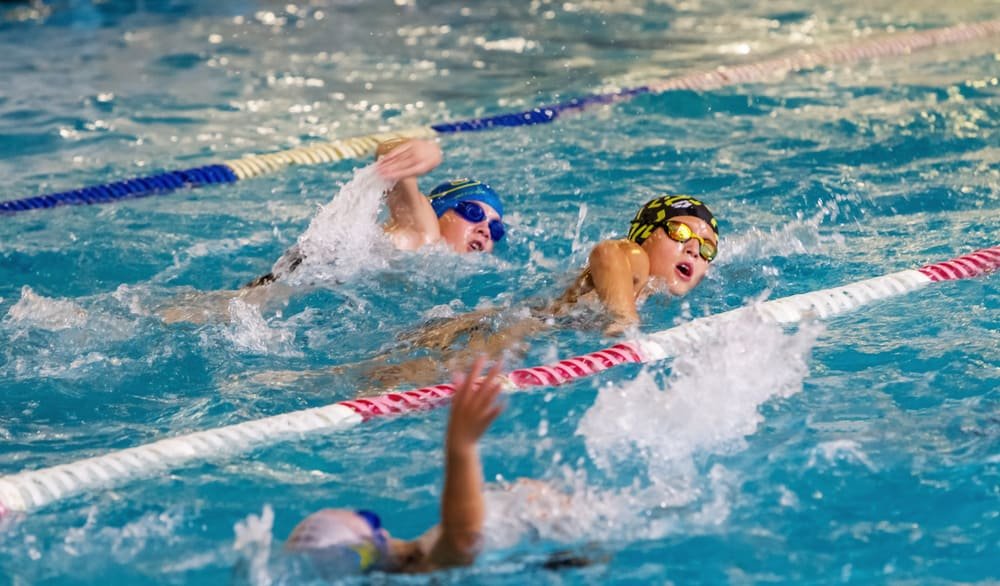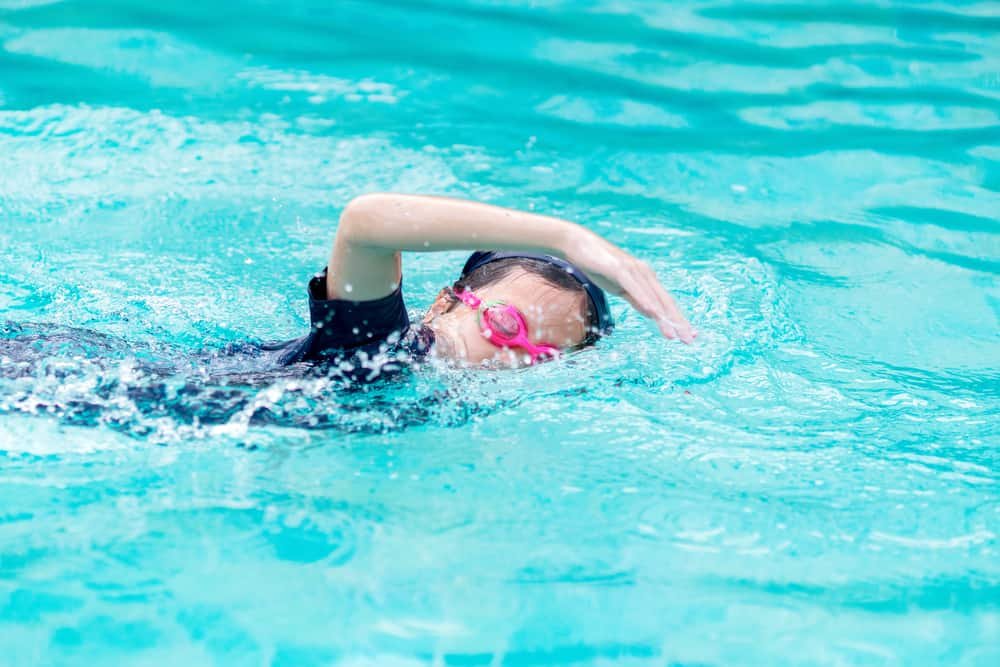
Can you guess how many Americans can swim?
The numbers will surprise you! A survey concluded that more than 50 percent of Americans either cannot swim or cannot perform the basic swimming moves that will save their life in the water.
But, there is something else you may not be aware of either. Swimming is a little treasure trove of all kinds of different benefits. And the best time to fully take advantage of them is while we’re young.
Here
These are 15 reasons why your kids should learn how to swim.
1. Improves Cognitive Development.
Physical exercise is not just about the body; it has many psychological and mental benefits too.
Regular exercise has been associated with better cognitive functions, as well as memory. Also, it can promote better brain plasticity and the growth of new brain neurons. Therefore, your child will be able to have an easier time focusing and paying attention. A simple activity, like swimming, can help your kids perform better at school.

2. Promotes Muscles Growth.
Exercise, in general, is the best way to build and develop children’s muscles, and swimming is not an exception. In fact, swimming can build muscle without placing any unnecessary strain on the joints and ligaments because it is a low impact exercise. It’s frequently recommended to people that are suffering from different injuries, as well as joint problems.
3. Strengthens the Bones.
Scientists have concluded that nearly 90% of the total bone mass is acquired by the ages of 18 to 20. This makes physical activity very important for kids because it improves their bone density which can prevent osteoporosis and other bone-related problems as they get older. Low bone density can be a serious condition, especially for older people whose bones are more brittle and can easily be fractured.
4. Strengthens the Heart.
Swimming is an activity that improves heart health. Even small bouts of physical activity can significantly improve one’s heart health and significantly reduce the chances of developing cardiovascular disease.
In overall, swimming will give your heart a good workout. It is one of the best and most inexpensive ways to strengthen your heart and improve your quality of life. And the sooner you start, the better the outcome.

5. Swimming Boosts Confidence.
Scientists have discovered that exercise is associated with better confidence and self-esteem levels. There is both a direct and indirect association between exercise and self-esteem. Kids with lower confidence levels may find it hard to cope with their everyday problems and challenges. And regular exercise may be one of the best ways to prevent that.
6. Develops Spatial Awareness and Coordination.
Swimming is an activity that promotes the development of spatial awareness and balance. Through swimming, kids acquired better coordination, as well as body control. Also, by being in the water, children will be actively thinking, coordinating, and controlling their body movements, improving, and developing their motor skills.
7. Keep Lungs Healthy.
Regular swimming has a well-established positive effect on lungs function and capacity. It forces the body to adapt appropriately by breathing as efficiently as possible. Although studies suggest that swimming does not necessarily make your ribcage bigger, the benefits are still quite clear – better stamina, endurance, and ability to breathe optimally.

8. Reduces the Risks of Drowning.
Swimming is a valuable skill that can save your child’s life.
Statistics show that drowning is the second leading cause of unintentional injury-related deaths among children ages 1 to 14. In total, 20% of the people that die from drowning are children. Teaching your child to swim will provide them with the necessary skills and abilities to enjoy a day at the beach.
9. Improves Posture.
Poor posture, as well as back problems, are becoming increasingly more common among children, and as a result, this can lead to a lot of health problems later in their life. A study done with 154 ten-year-olds discovered that nine percent of the kids already had severe problems with at least one of the discs in their spine. And in another study, 38 percent of children ages 4 to 12 had poor posture.
Swimming from an early age could potentially help reduce the poor posture epidemic. This activity involves the whole body; it strengthens and develops the back and the abdominal muscles.
10. Has a Positive Effect on Appetite.
Although a low impact exercise, swimming can be quite energy demanding. According to a study, swimming can potentially stimulate and improve appetite. Even light and short swimming sessions can cause a hunger sensation.
11. Decrease Chances of Obesity.

Today, child obesity is becoming a growing concern. It affects millions of children in the US alone. The reasons for that are many, one of which is the predominantly sedentary lifestyle. Americans spend, on average, 11 hours a day sitting!
Coupled with healthy lifestyle choices, regular swimming can be an excellent way for your kids to stay active, burn fat, maintain healthy body composition, as well as physical strength.
12. Improves Energy Levels.
Exercising unleashes a whole plethora of different positive effects on the body. By regularly doing some kind of physical activity, your child will have better and higher energy levels.
Although not done on kids, a study found that even 20 minutes of aerobic workout, done three times a week for six weeks, increased energy levels and decreased fatigue levels in healthy adults. Therefore, a regular swimming workout can potentially be a great way to have your child stay more active, full of energy, and less exhausted.
13. Reduces Stress and Improves Mood.
The constant nervousness, fear, or worry our kids can experience on a daily basis can affect them negatively, not just their mental but physical health as well.
Different studies have concluded that exercise helps tremendously with stress, anxiety, and depression. Exercise also boosts the levels of certain hormones that make us feel more optimistic and happy. If to this, we consider the natural buoyancy of the water, swimming can be quite relaxing and meditative compared to other types of sports.
14. Improves Sleep Quality.

It is not a rare occurrence for kids to have poor sleep habits. Studies show that sleep disorders among infants and children are very common – some numbers go as high as 30 to 40 percent. Therefore, it’s important to mention that physical activity and exercise have been shown to improve one’s sleep quality, as well as insomnia symptoms.
15. Social Benefits.
In this time and age, of phones and screens, everyone is becoming more socially isolated. Even surveys show that millennials are getting less social interactions because of today’s social media. Hence, participating in swimming lessons can be an excellent way for children to improve their social skills.
Both loneliness and isolation are quite a common occurrence – nowadays, more than ever. By training with others or joining a swimming class, kids will get to interact with others, easing any potential symptoms of isolation. As a result, this will lead to better mental health and quality of life for them.
